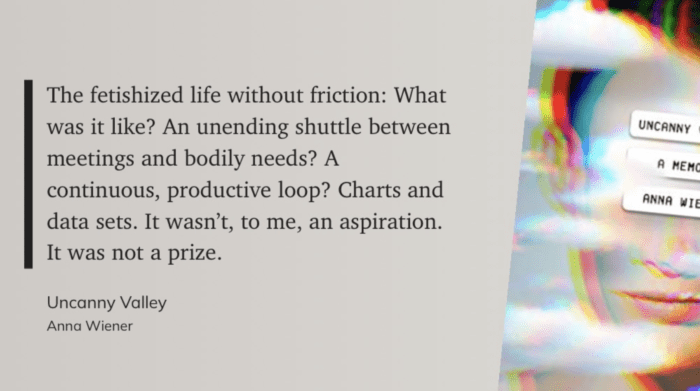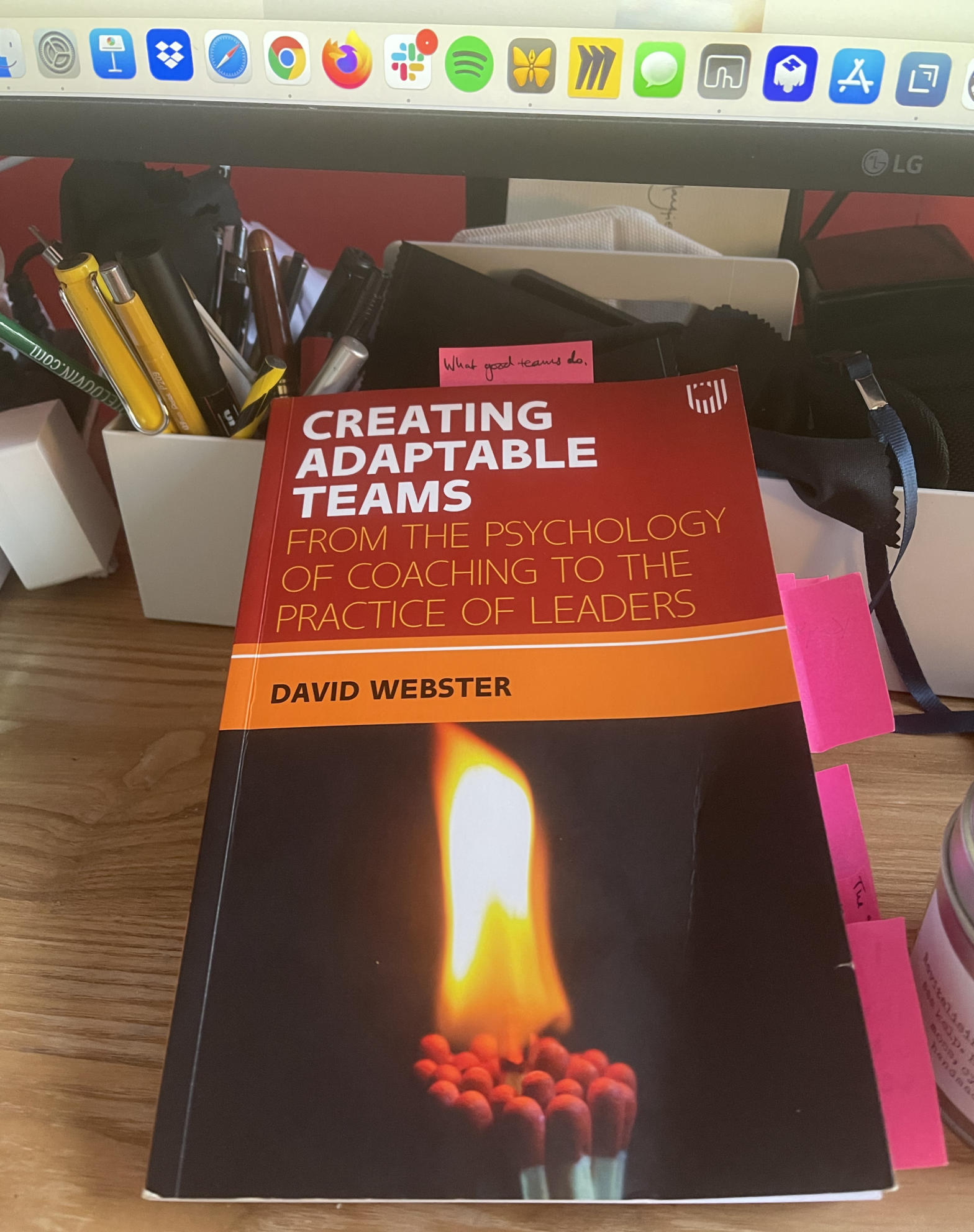This is the third part of a series about the best books I read in 2021. Usually I publish these over the Christmas holidays – this one was slightly delayed by a wonderfully busy and productive January. The posts about fiction and non-fiction books of the year can be found by following the links.
I almost merged the non-fiction and business categories in this year’s review – they seem so close together. The Art of War and Working both have a great deal to say that is relevant here. How To Be Broken‘s advice about resilience is as relevant to the workplace as any other in our lives. So the division is slightly arbitrary, and given another round of editing I’d probably move a few around. However, all of these books were useful to read and apply in my work, and I recommend them to you…
1. Creating Adaptable Teams, by David Webster
We hear about leadership, and sometimes about followership. David Webster has focused on the idea of “teamship” – and it’s a profoundly useful and practical concept.
David Webster is a coaching psychologist, and an expert on how teams work. He’s worked with us at Brilliant Noise for some years. His company, Centre for Teams, is hugely respected by myself and my peers. (He’s also worked with coaching teams at some of the biggest companies in the world and sports teams.) David asked me to write the foreword to Creating Adaptable Teams, a task which I was deeply honoured to take on.
The key to the book is simple but under-explored in business books, how teams really work. As David puts it:
Team leadership is really the forgotten art. There is no more important role in any organisation than those who lead small teams. Given the critical place that teams play in all our lives, learning how to lead them effectively is similarly critical. Without effective team leadership, the teams will falter, and the organisation will fail its team members.
If you lead a team, or aspire to, this book is a gift. It’s published by Open University Press, and while underpinned by academic rigour, it is very much a manual – practical, evidence-based frameworks and processes – for working in teams. As you can see from my copy (below) – it’s a book that works hard, earns its keep, and lives close at hand on my desk.

2. Noise: A Flaw In Human Judgement, by Daniel Kahneman, Oliver Sibony, Oliver Sibony and Cass R Sunstein

Another book whose ideas were immediately put to work at Brilliant Noise this year was the latest title from Daniel Kahneman and his co-authors, who wrote the influential masterpiece Thinking Fast and Slow.
Why do different people make such different judgements? The book starts by looking at judges sentencing and insurance loss adjusters paying out and then works through all of the ways in which “noise” creeps into decision making.
Of particular practical use to everyday business are its application of the concept to decision-making, recruitment and forecasting:
Forecasts are noisy. Professional forecasters offer highly variable predictions about likely sales of a new product, likely growth in the unemployment rate, the likelihood of bankruptcy for troubled companies, and just about everything else. Not only do they disagree with each other, but they also disagree with themselves. For example, when the same software developers were asked on two separate days to estimate the completion time for the same task, the hours they projected differed by 71%, on average.
Although this is a popular science book, Noise sometimes makes you work for the insights, at least if, like me, maths isn’t your strongest suit. I enjoyed this aspect though – it felt like Noise asked something of you in the reading as much as telling you things.
3. Uncanny Valley, by Anna Wiener

This is an odd book to have here. It’s literary non-fiction, a memoir, but one which is all about living within the tech boom of the 2010s, first in New York and then in San Francisco. It is a business book though, because it is all about work, a history of business in a strange time and place, though not from the usual perspective of the guru, expert or successful executive.
I recognise this world, I spent chunk of my career going abck and forth to the America it describes. I even visited Silicon Valley for two whirlwind tours of campuses and technoplexes in the period this book covers, and lived and worked inside its expanding halo for all of that time: the books, the blogs, the businesses and ideas that connected with its coming giants, its technologies and ethos.
Like Nobody Is Talking About This and its mentions of “the dictator” and “the portal”, the book doesn’t use the names of big companies or public figures. Instead it refers to “the social network everyone hated” or “the VP at the search engine giant whose well-publicized hobby was stratosphere jumping”.
I recognised a reference to one of my favourite business books, The Hard Thing About Hard Things in one thinly veiled description:
He was reading a book by one of our investors, he said. I was familiar with it. The book offered guidance on how to navigate the choppy waters of entrepreneurship and conquer the twin demons of self-doubt and external pressure. It spoke of learnings, battles, journeys. Every chapter opened with an epigraph from a rap song. The struggle was real.
[…]
The book was good, the CEO told me. If you like this, you’ll love therapy, I did not say. I looked at his phone. He was on the first page of a chapter titled “Preparing to Fire an Executive.”
Ouch. I’d still recommend The Hard Thing About Hard Things to anyone starting a company or navigating its first years as a CEO, but still. It’s a New York book kicking the bloated and over-moneyed San Francisco tech scene. The swipe at “the struggle” is a dig at one of the sections in the book describing how intensely stressful and lonely running a start-up can be. That passage is one that got me through a couple of tough spots. Also not every chapter starts with a rap lyric – the first one is from Gloria Gaynor. But now I’m getting petty.
It was a great read. Not a comfortable one. For me, it was balancing more than balanced. Given how much tech Kool Aid I gulped down over those years, I was nauseous see echoes of my own naivety in its accounts of the time:
Social would bring liberal democracy to the world. Social would redistribute power and set people free, and users would determine their own destinies. Deeply rooted authoritarian governments were no match for design thinking and PHP applications. The founders pointed to Cairo. They pointed to Moscow. They pointed to Tunisia. They side-eyed Zuccotti Park.
The book’s flavour is piquant and complex but with a curious bitter aftertaste. Going back over my notes and highlights the rancour is more pronounced than I recall. Why did I like it so much at the time? One reason is where the book, and social media and the Silicon Valley it portrays eventually led.
I read Uncanny Valley in the first dark days of January 2020, when social media’s ugly side was reified on the steps of the Capitol in Washington. It ends with the author and other confused San Francisco tech workers campaigning on suburban doorsteps for Hillary Clinton and finding more support for Donald Trump than they expected, realising their companies, their culture, had made the Trump phenomenon possible:
We were too old to use innocence as an excuse. Hubris, maybe. Indifference, preoccupation. Idealism. A certain complacency endemic to people for whom things had, in recent years, turned out okay. We had assumed it would all blow over. We had just been so busy with work, lately.
An author I love rated this with one star on Goodreads. I gave it five stars at the time, but I know what they mean. I know why you could hate this book. But Uncanny Valley challenged me and stuck with me through the year, so it belongs on this list.
4. Chatter: The Voice in Our Head and How to Harness It, by Ethan Kross
We keep being told to try and “live in the present” and “be more present” – but it’s just not what our minds are made for, says neuroscientist Ethan Kross in this book about that constant companion: the voice in our heads. We spend just a third of our lives in the present tense, the rest of the time we are time-travellers, skipping between back and forwards, re-writing the past and drafting possible futures:
Our verbal stream of thought is so industrious that according to one study we internally talk to ourselves at a rate equivalent to speaking four thousand words per minute out loud.
Reminding me of to Julian Bagginni’s beautiful phrase from The Ego Trick – “‘I’ is a verb masquerading as a noun” – Kross explains how our inner voice is we tell to invent ourselves from moment to moment:
Our verbal stream plays an indispensable role in the creation of our selves. The brain constructs meaningful narratives through autobiographical reasoning. In other words, we use our minds to write the story of our lives, with us as the main character.
The time-travelling mind can also bring comfort if we use it consciously, through its distancing effect:
You can also benefit by mentally time traveling into the future, a tool called temporal distancing. Studies show that when people are going through a difficult experience, asking them to imagine how they’ll feel about it ten years from now, rather than tomorrow, can be another remarkably effective way of putting their experience in perspective. Doing so leads people to understand that their experiences are temporary, which provides them with hope.
5. Framers: Human Advantage in an Age of Technology and Turmoil, by Kenneth Cukier, Viktor Mayer-Schoenberger, and Francis de Vericourt
Where Chatter says we can’t “be present” no matter how much eat-pray-love advocates tell us we should, Framers gives the tired old “think outside the box” advice a kicking:
The evolution of human thinking has played a crucial role in all these improvements. Before there is a change on the ground, there is a transformation in the mind. All that is without starts from within. We frame and reframe our world, and civilization advances.
So, less “think outside the box” than “be conscious that you are thinking in a box but you can try a whole load of other boxes to see if they work better”.
We reframe things all the time. Some of us are better at it than others. What Cukier et al do is lay out ways that you can get better at this skill and apply it more deliberately to decision making. Fantastic.
The links in this blog post are affiliate links to Bookshop.org, an online bookseller that supports local bookshops. In the event of me making any commission I will be spending the proceeds on more books. All of these books and more curated lists will can be found in my Antonym Books page there.

Leave a Reply
You must be logged in to post a comment.